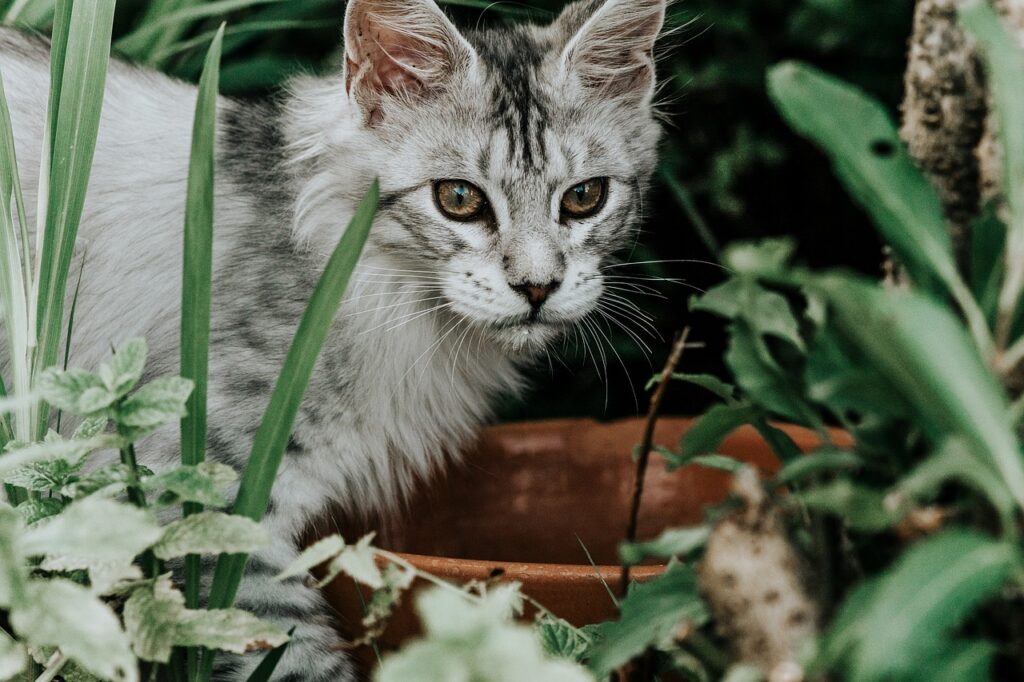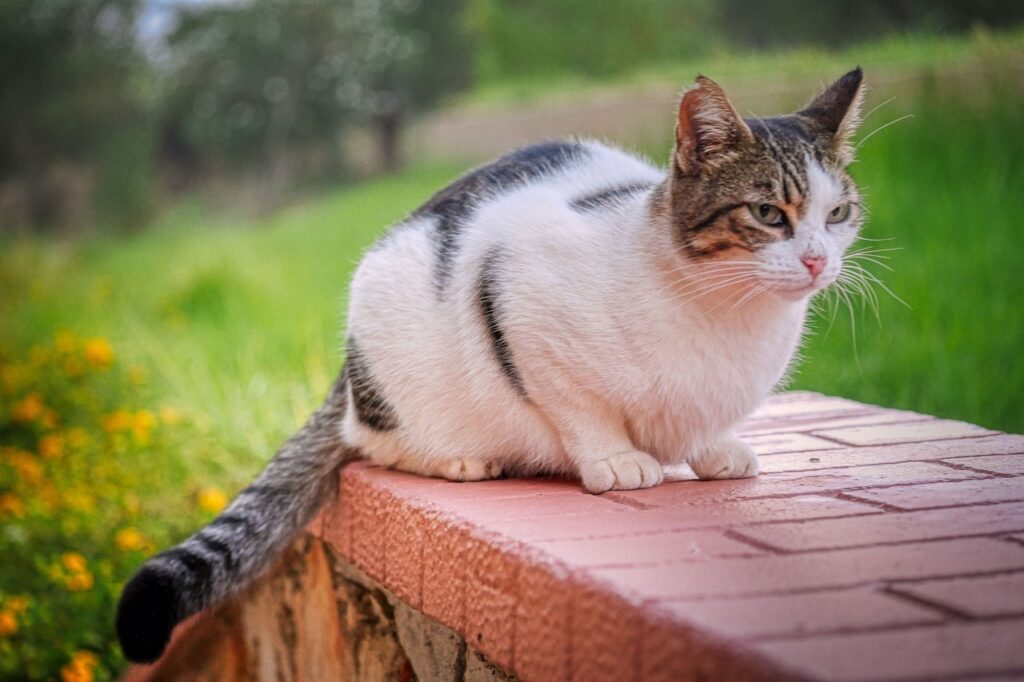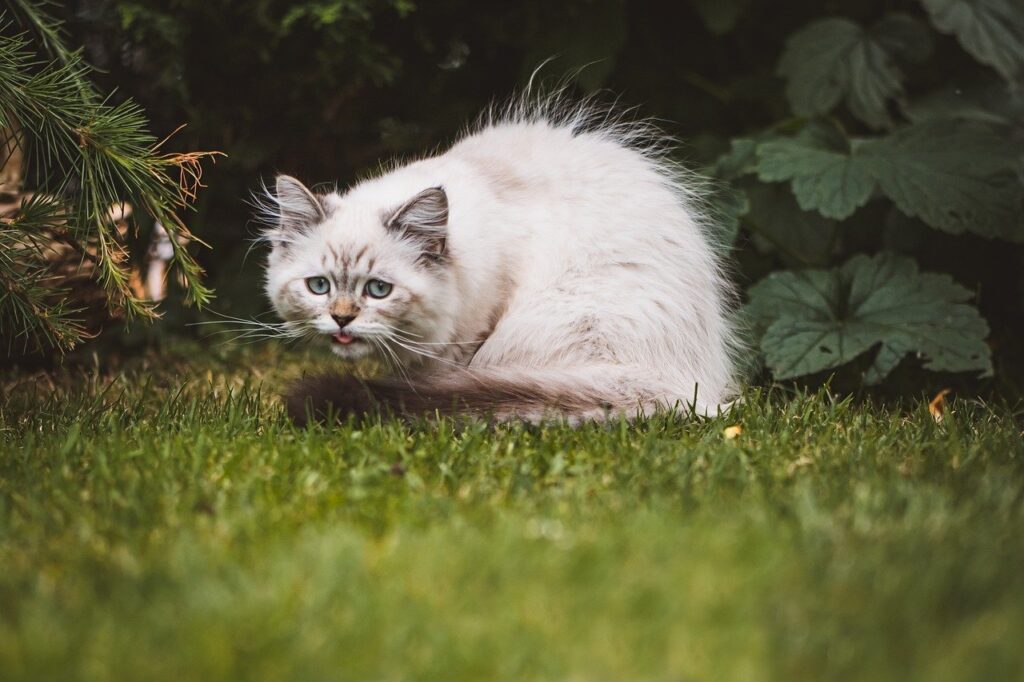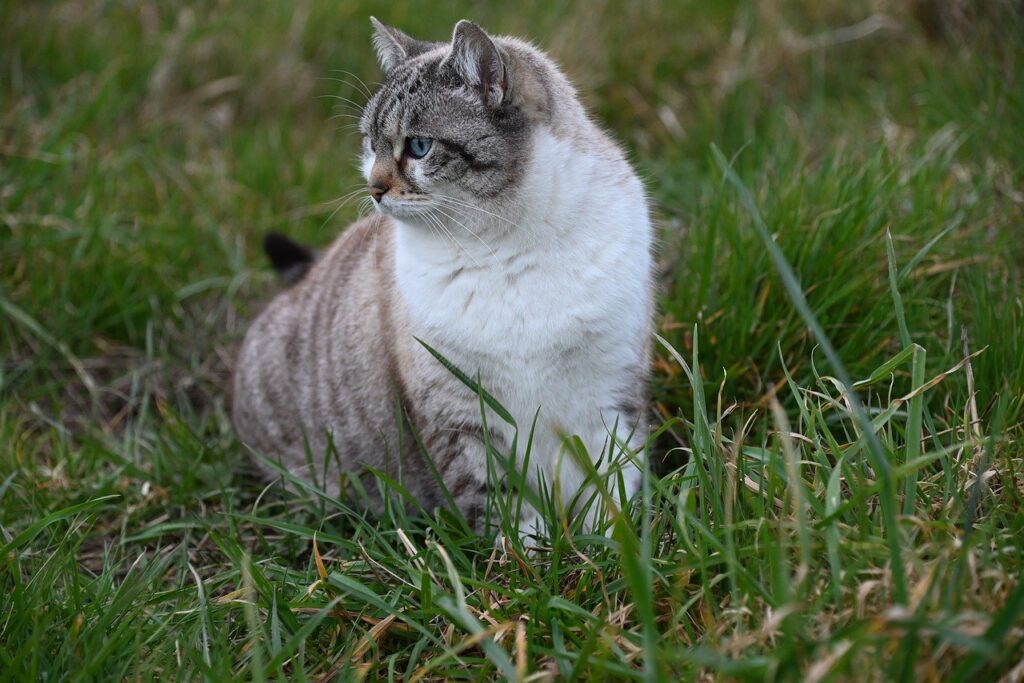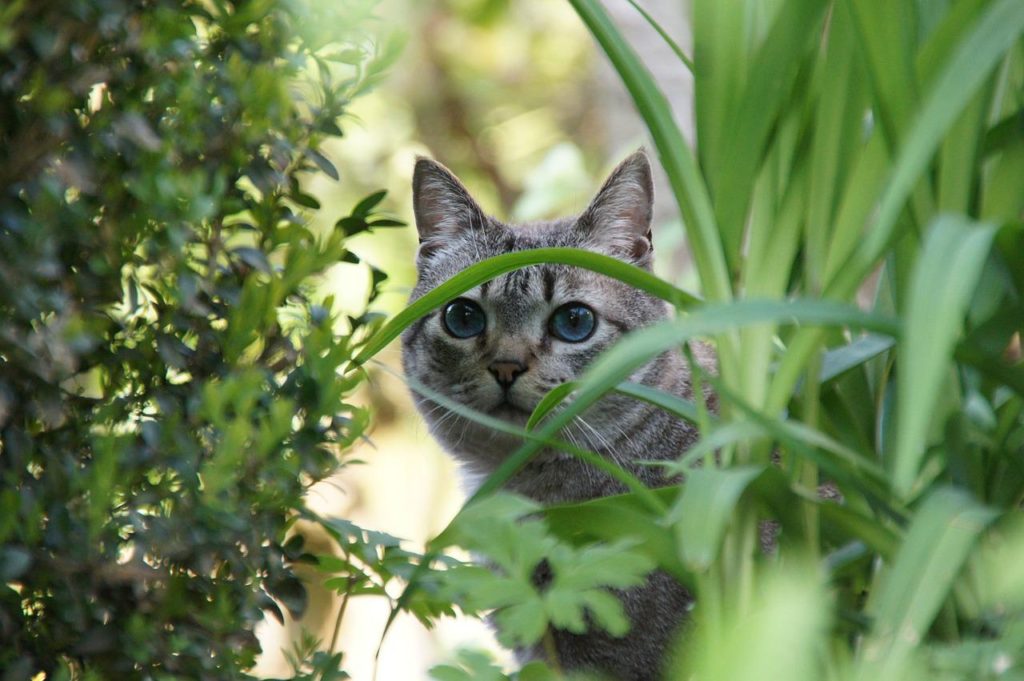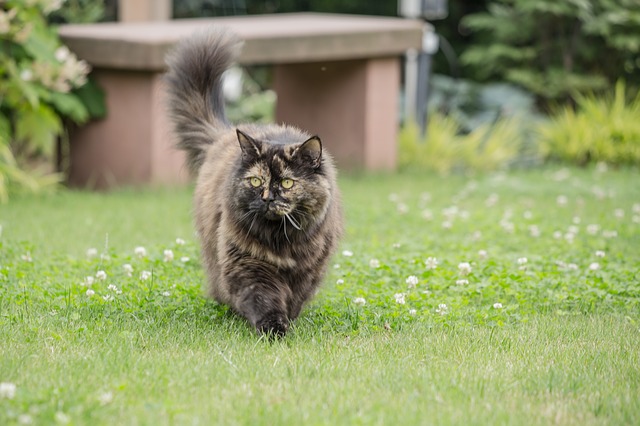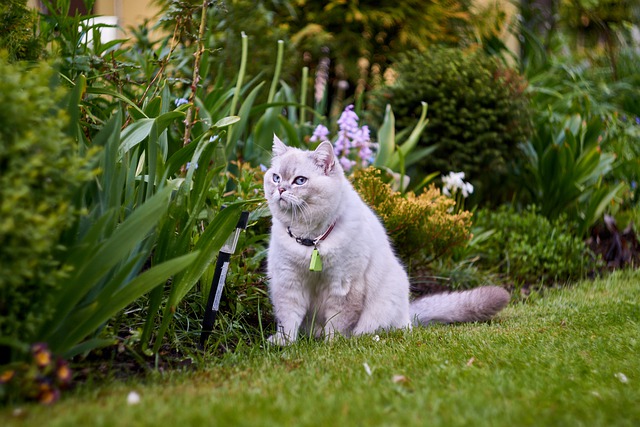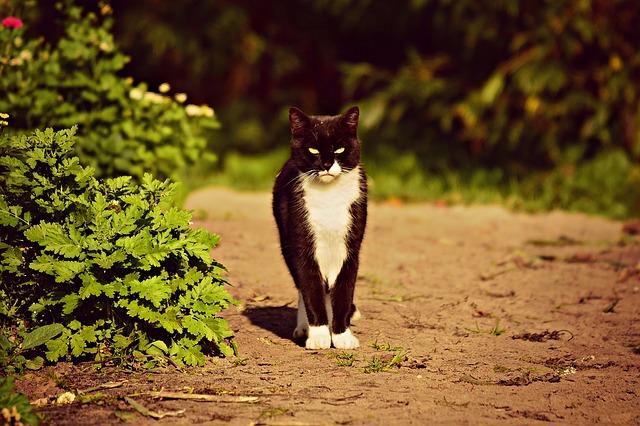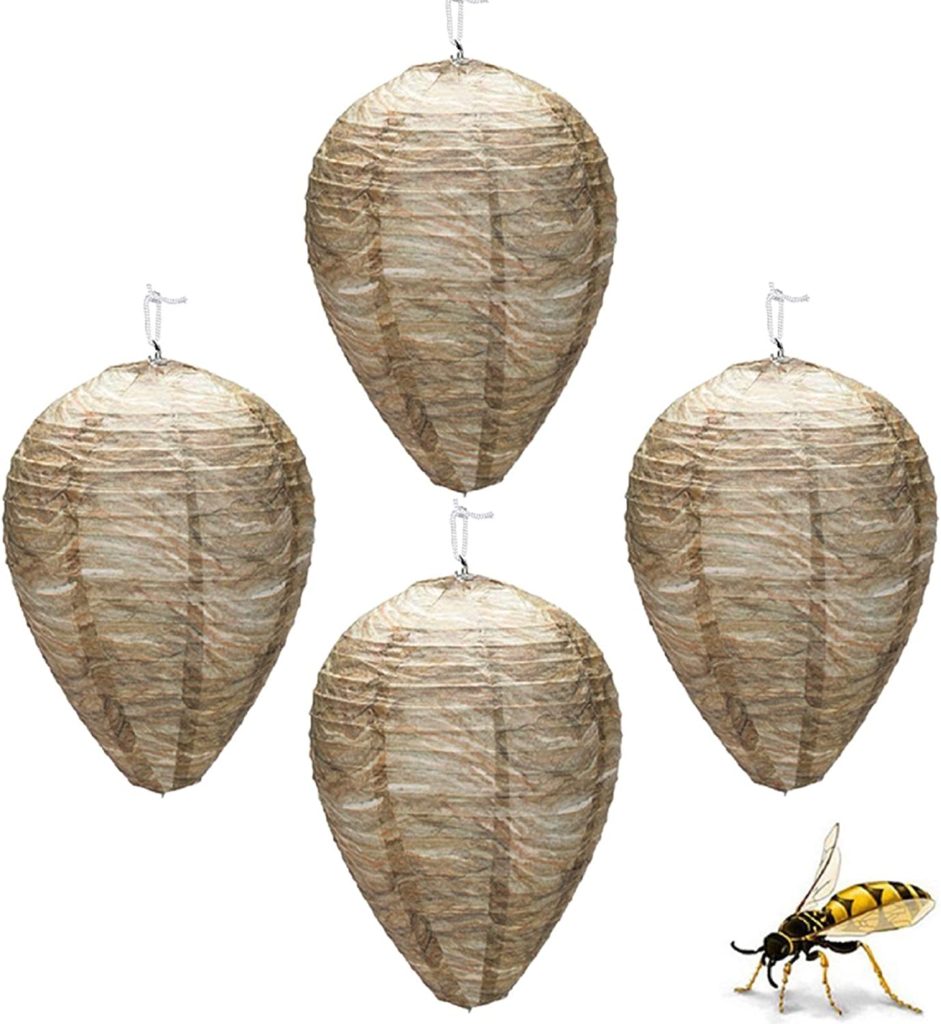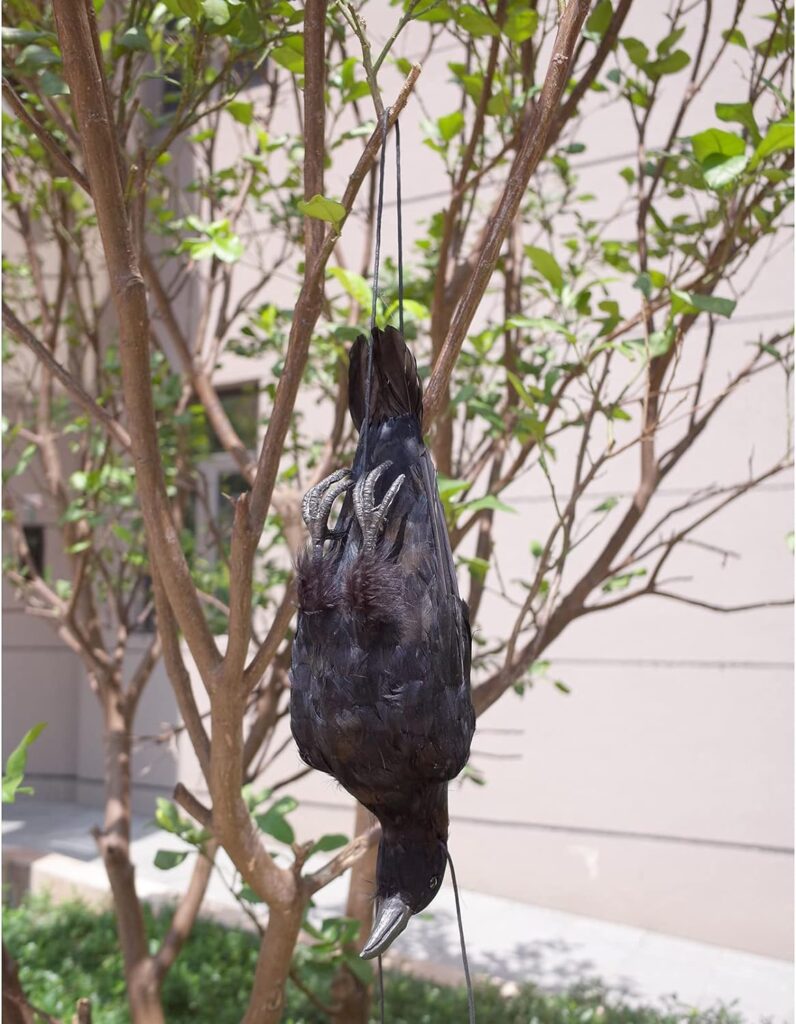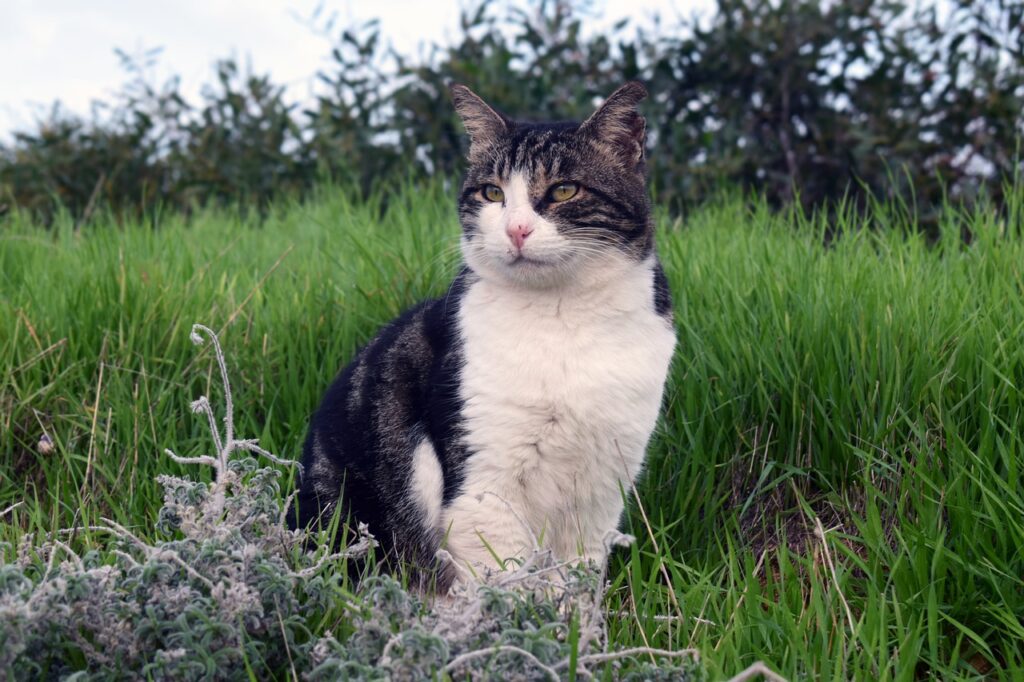
Are you tired of neighborhood cats wreaking havoc in your garden or yard? What if we told you that there is a simple, natural, and effective solution to repel them? Enter the humble orange peel to deter cats, a surprisingly powerful DIY cat repellent that has been overlooked for far too long.
Short Summary
- Reasons to deter cats
- Orange peels can be used as a safe and effective cat repellent
- Alternative methods for deterring cats
Why Deter Cats?
Whether they are neighborhood cats or even your own pets there are many reasons to keep cats away from specific areas such as:
Digging
Cats often dig in gardens and yards to bury their waste. This can disrupt plantings and damage gardens.
Defecating
Cat feces has a very strong and unpleasant smell. And it can also carry parasites that can be passed to other animals, pets, and humans. For example, toxoplasmosis can survive in the soil for many months and can be transferred to vegetables grown in contaminated soil.
In humans, toxoplasmosis is typically mild but can be severe in people with weakened immune systems or in pregnant women, as it can harm the unborn baby. Cats can excrete roundworm eggs in their feces. These eggs can remain viable in the environment for months or even years.
If another cat or a person (typically a child playing in the dirt) accidentally ingests the eggs, they can hatch into larvae and cause an infection. Like roundworms, hookworm eggs are passed in cat feces and can contaminate the soil. They can penetrate the skin of a host that comes into contact with them.
Hunting
Cats are natural predators and may kill birds, small mammals, and other wildlife. This is particularly problematic if you’re trying to attract birds to your yard or feeder.
Property Damage
Cats can trample your seedlings, flowers, and shrubs. They may also claw at trees, outdoor furniture, scratch cars, or even parts of the house causing damage.
Noise and Fighting
Cats can make loud noises, especially at night when they are most active. This can be disruptive to people trying to sleep. Cats may also fight with each other, leading to more noise and potential injury to the cats themselves.
Allergies
Some people are allergic to cats, and having them in the yard or certain spaces can trigger these allergies.
Neighborhood Disputes
If a neighbor’s cat is visiting your yard regularly, it can lead to disputes, particularly if the cat is causing damage or creating a health risk.
To Protect Them
It may be necessary to deter cats from an area to protect them from harm. For example, to keep them away from plants that can be dangerous to them if ingested such as plants like lilies, or foxglove.
The Power of Orange Peels: Why Cats Dislike Citrus
Luckily orange peels (and the peels of other citrus fruits) offer a humane, safe, and inexpensive way to keep felines away. But why do cats dislike citrus so much? The answer lies in their sense of smell which is actually five times greater than that of humans. With such sensitive noses, cats find the strong aroma of citrus fruits overwhelming.
More specifically it is the limonin and acidity in the citrus fruits that they have an aversion to. Orange peels contain a particularly strong scent of citrus that is quite potent. And the smell of the peels causes cats who encounter it discomfort, so they will generally steer clear of an area where peels are placed.
How To Use Orange Peels
It’s easy to make an effective orange peel cat deterrent to keep unwanted feline visitors out of your yard. You’ll need to peel several oranges and then use a knife to chop the pieces of peel into approximately one-inch-sized pieces. The chopped-up peel should be scattered in the places where you’ve seen cats, or you particularly want to keep them away from such as flower beds.
Placing your peels around the perimeter of the areas also works as well. Of course, the larger your garden, the more pieces of peel you’ll need for the orange peel cat deterrent to work as effectively as possible. To prevent your peels from blowing away before they can do their job; you can secure them in place with a thin layer of bark mulch.
Another option is to place peels in mesh bags and tie them to stakes that are inserted in the ground. By placing orange peels strategically around your property, you can create a barrier that deters cats from entering certain areas. This method is not only effective but also environmentally friendly, as orange peels decompose over time and add nutrients to the soil such as potassium and nitrogen.
Things To Remember
It’s important to remember that all cats are different. So while peels may work for the majority of cats, not all cats will react the same way. Some may not be bothered by it, so you may need to try other methods to deter them. Also, orange peels deter cats because of their strong smell. So in order for them to work continuously you will need to add new peels over time.
Just how often can depend on several factors such as the size of the space, the size of the peels, and how bad your cat problem is. Weather can also play a role. In cool and wet weather orange peels tend to last longer while in hot and dry weather, they will lose their scent more quickly.
In general, orange peels will typically be effective anywhere from a few days to up to about a week before needing to be replaced depending on the conditions. A good rule of thumb is to simply replace them once they dry up and are starting to lose their potent smell.
Also, be aware that orange peels are acidic and they can impact the pH of the soil. This may not be ideal for certain plants that prefer alkaline or neutral soil such as lilacs, clematis, or boxwoods. That being said this usually isn’t an issue unless you are using very large quantities of peels on a regular basis.
Using Orange Peel To Repel Cats Indoors
Orange peels can also be used indoors to deter cats from specific areas. They can be placed in a bowl or a container near the base of furniture that you want to protect from being scratched. Putting the peels on tables and countertops can help keep cats from jumping up onto these surfaces. And to prevent cats from entering into a specific room you can place peels near the door.
You can also use your orange peel cat deterrent to keep your felines from digging in or chewing on your houseplants. Or to help keep them away from potentially dangerous plants such as cacti for example. Placing some peels in the topsoil of your plants should repel them. Just remember to throw your peels away before they get moldy or when they dry out and begin to lose their citrus smell. And then replace them.
Creating a DIY Orange Peel Cat Repellent Spray
Making a DIY orange peel cat repellent spray is an easy and effective alternative. Simply fill a large pot with orange peels, cover them with clean water, and boil them for approximately 15 minutes. Allow the water to cool before filling a reusable spray bottle with it. This citrus-infused water can then be sprayed a few times a week around areas where cats are not welcome.
Another option is to combine citrus-scented dish soap and lemon juice in a spray bottle. This mixture can also be used to deter cats from entering certain areas. Just remember to test the spray on an inconspicuous area first to ensure that it will not cause any damage to the material.
Safety Concerns: Are Orange Peels Harmful to Cats?
While orange peels are generally safe to use as a cat repellent, it is important to address the fact that in large quantities the essential oils in citrus fruits like oranges can be toxic to cats. Cats are naturally curious animals, and there is always a risk that they may ingest the peels. However, because they find the smell so unappealing it is highly unlikely they would actually eat any peels let alone a quantity that could be lethal.
Like mentioned above, you can place the peels in a mesh bag. This not only helps to keep them from blowing away outdoors but will also help prevent curious cats from consuming them. Symptoms of citrus poisoning include vomiting, diarrhea, lethargy, and loss of appetite. If you suspect that a cat has ingested citrus, contact your vet immediately.
Alternative Methods for Deterring Cats
If you find that orange peels are not providing the desired level of deterrence, you can also try using other citrus fruits, such as lemons and limes. When comparing the effectiveness of different citrus fruits in deterring cats, it appears that oranges and lemons are more effective than limes. However, all citrus fruits have some degree of effectiveness in keeping cats at bay.
The key is to find the right combination of citrus scents that works best for your specific situation. There are also other natural scents that can help repel cats. These scents include lavender, rue, geranium, penny-royal, lemon thyme, and coffee grounds.
However, it is essential to be aware of the potential hazards of using natural scents to repel cats. Some sources of scents may be toxic if consumed by cats, so always exercise caution and ensure that the scents are used safely and responsibly. There are other alternative methods for deterring cats that you may want to consider as well.
These methods include motion-sensor sprinklers, motion lights, water guns, noisemakers, chicken wire, and spiky objects such as cat-repellent mats or even pine cones. By exploring various methods of cat deterrence, you can find a solution that works best for your situation and ensures the safety and well-being of both your cats and the neighborhood felines.
Summary
In conclusion, orange peels and other citrus fruits can serve as a natural, safe, and effective DIY cat repellent. By harnessing the power of orange peels, you can deter unwanted feline visitors from your garden or even indoors. Additionally, alternative methods such as mechanical solutions and other natural scents can be employed to provide a well-rounded approach to cat deterrence.
And always remember to exercise caution when using citrus fruits as a cat deterrent and monitor your cats for any signs of accidental ingestion or citrus poisoning.
Frequently Asked Questions
Do orange peels keep cats away?
Orange peels are an effective deterrent for cats, as cats have an aversion to citrus smells. Placing the peels of oranges or any other citrus fruit around your garden and specific plants can help keep cats away.
Do cats hate the smell of orange peels?
It is generally accepted that cats hate the smell of orange peels. This is likely because citrus smells tend to be strong, and cats can be sensitive to intense aromas and particularly citrus smells.
Are orange peels toxic to cats?
Orange peels can be toxic to cats. The oils and citric acid in them can cause irritation and if a cat were to consume a large quantity of orange peels it could be fatal. Yet this is highly unlikely since they do not like the intense smell of orange peels and therefore typically would stay away from them let alone consume them or consume them in large quantities.
Start Shopping for Cat Repellents!
What Smells Do Crows Hate?
Crows can be quite a nuisance. And one natural way to deter them is by using scents that they dislike. But what smells do crows hate? Read on to find out! Pest Crows Crows are often considered to be pests. In agricultural areas, they are well-known for causing crop...
How To Get Rid Of Owls In Your Yard
While owls are amazing creatures and can help to function as natural pest control, they are not a bird everyone wants on their property. Fortunately, when it comes to how to get rid of owls in your yard there are quite a few things you can do to deter them. Here’s...
How To Make Irish Spring Deer Repellent
Irish Spring isn't just a soap that has a pleasant and energizing fragrance. It's also an ingredient that can help keep your outdoor space healthy and inviting. By making your own Irish Spring deer repellent you can help keep nuisance deer at bay. Here's what you'll...
The Best Cat Deterrent Plants
Cats are adorable and beloved creatures. That doesn't mean, however, that they belong in your garden. The last thing you want is to see felines eating your favorite plants, or using your garden as their personal toilet. So here are some of the best cat deterrent...
Do Coffee Grounds Deter Cats?
You may find your garden and yard smelling awful because the neighborhood cats have decided to treat the area as their giant litter box. Not only can it really stink but it’s unsanitary too. Cats may also be tearing up plants and digging out seeds and bulbs. You may...
Will Coffee Grounds Keep Cats Away?
If you find that the neighborhood cats are treating your garden and yard like a personal litter box, it is time to use coffee grounds to keep cats away. You may wonder, "Will coffee grounds keep cats away?" The answer is yes, they will. This is not a myth or an old...
Cats And Coffee Grounds
For most of us, our first cup of coffee in the day is like a drink of ambrosia. Not only does it smell and taste delicious but it has many other advantages. Cats and coffee grounds do not go together. And this is great if you are having trouble with cats littering up...
Everything You Need To Know About Fake Wasp Nests
Buy on Amazon Wasps are aggressive pests that have a painful and potentially dangerous sting. Luckily you don’t have to risk serious injury in order to keep them away. A much easier option is to use a fake wasp nest to deter them. And here is everything you’ll need to...
The Complete Guide To Bird Cannons
Buy on Amazon Birds and other pests can be a huge nuisance for farmers, businesses, and homeowners in rural areas. They can cause an incredible amount of damage, a loss of income, and also be a major safety concern. A bird cannon is a cost-effective and highly...
Types Of Pest Birds
Pest birds come in a variety of shapes and sizes. However they all have one thing in common: they can be a real nuisance to us humans in one way or another. The following are the most common types of pest birds you’re likely to encounter. European Starling The...
Dead Vulture Decoys: The Beginner’s Guide
Buy on Amazon Vultures in flight can look elegant as they soar high above. However, these large birds can be a big problem once they’ve decided to land on your property. A dead vulture decoy is one of the most efficient tools for deterring these pests. And here...
The Total Guide To Dead Crow Decoys
Buy on Amazon Whether you live in the country, suburbs, or even the city, dealing with pest crows can be a significant problem. One of the most effective methods for controlling these nuisance birds is using a dead crow decoy. This all-in-one guide will cover...
Falcon Decoys: Everything You Need To Know
Buy on Amazon Dealing with the damage and mess caused by pest birds is never fun. However, you actually don’t need to spend much time or money in order to get rid of birds and other pest species. With the help of a falcon decoy, you can take advantage of their natural...
All About Hawk Decoys
Buy on Amazon Pest birds can make a huge mess and cause a lot of expensive damage. To help keep birds and other pests away, a hawk decoy is an effective and safe solution. So here is your complete guide to them. Why A Hawk Decoy? Hawks are one of the most widespread...
The Complete Great Blue Heron Decoy Guide
Buy on Amazon A hungry heron can easily make a meal out of expensive pond fish. One of the most effective methods for protecting your pond from these smart birds is with a great blue heron decoy. Here is your complete guide to them, with all the info and tips you’ll...
How To Keep Blue Herons Out Of Your Pond
Great blue herons are one of the biggest problems that pond owners face. These birds are not only smart but can easily catch and swallow large numbers of surprisingly big pond fish. Therefore you’ll need to know how to keep blue herons out of your pond in order to...
How To Deter Herons From Your Pond
Herons are designed by Mother Nature to hunt fish. And unfortunately for pond owners, they often find pond fish to be an easy meal. So in order to protect your fish, you will want to know how to deter herons from your pond. Alligator Decoys Alligators are natural...
How To Get Rid Of Snapping Turtles In The Pond
Buy on Amazon While there are some turtle species that can live peacefully in backyard ponds snapping turtles are typically not one of them. Not only are they carnivorous but also potentially dangerous. However before you try and catch one, you’ll want to know how to...
Live Animal Cage Trap Tips For Success
Buy on Amazon Pests can be a major hassle; they can cause costly damage, make a mess, and can even spread disease. Many homeowners choose to trap pests on their own using what are known as live animal cage traps. These traps are totally humane and allow you to safely...
Common Pond Pests And How To Deal With Them
While there are many benefits to owning a pond, one of the drawbacks is dealing with pests. And whether big or small they can definitely be a nuisance. Here are some of the most common pond pests you’re likely to encounter along with the basics on how to deal with...
